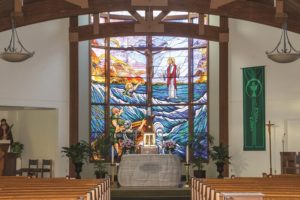PROVINCETOWN — Nearly three-quarters of the U.S. Conference of Catholic Bishops (USCCB), the national organization of bishops, voted on June 17 to draft a new statement on the meaning of holy communion, a central act of worship in the Catholic faith, considered an experience of connection with the divine.
Some have argued the statement was needed to clarify what the religion’s Holy Eucharist actually is. Research dating to the 1990s indicates this is a point of confusion among American Catholics. But other bishops argued during the debate that the USCCB decision was needed as a way to rebuke President Joe Biden for his support of abortion rights.
Bishop Edgar da Cunha, leader of the Fall River Diocese that directly oversees Catholic congregations on the Cape, including the churches in Provincetown and Wellfleet, is not disclosing how he voted on the issue, according to John Kearns, a spokesman for the diocese.
Da Cunha did not sign a May 13 letter from 67 high-ranking church officials, including Cardinal Sean O’Malley of Boston, urging the USCCB not to draft a new statement on the Eucharist, according to a report in The Pillar, a Catholic news outlet.
In a post on the bishop’s blog, Da Cunha emphasized that the vote by the USCCB was purely about religious doctrine, not about politics. “There is nothing in this proposal, nor is it planned, to include language regarding the giving or denying of Eucharist to any person or category of persons,” he wrote.
A backlash followed the bishops’ vote, and the USCCB released a Q&A stating that there will be “no national policy on withholding Communion from politicians.”

The Rev. Hugh McCullough, known by parishioners as Father Mick, is the priest at St. Peter the Apostle in Provincetown and Our Lady of Lourdes in Wellfleet. He said he felt the news media had mischaracterized the vote as a political act. “It’s incorrect,” McCullough said. “They’re putting a slant on it.”
But results of a poll by the PEW Research Center reported in March show a sharp partisan divide among Catholics on this question: 55 percent of Catholics who identify with the Republican Party said Biden’s abortion stance should disqualify him from communion, compared with 11 percent of Catholics who lean Democratic.
In Barnstable County, which is disproportionately Catholic and Democratic, it is unclear how the vote will sit with churchgoers. According to the 2010 U.S. Religion Census, just over 40 percent of Barnstable County residents are Catholic, and just over 60 percent of county residents who voted chose Biden in the 2020 election, according to the Associated Press.
Mary Fox of Wellfleet, a practicing Catholic who attends Mass regularly, said she was disappointed when she read about the vote. Fox, who is a self-described moderate, said she supports Biden because she believes he embodies Catholic values, specifically because of his empathy and concern for the poor.
“It’s disturbing that they’d single out somebody,” Fox said. “And it concerns me that it’s a political statement, which I think it is.”
Eugene Toland, a retired missionary who still occasionally presides over Mass at St. Joan of Arc Church in Orleans, said he was “saddened to see that there is such division,” but was not surprised, given the current state of political polarization in the U.S.
While he was disappointed in the bishops at the conference who mentioned Biden by name, Toland said it was difficult to know the exact motivations of all those who voted to draft a new statement — he took their words “at face value.”
Tom Ryan of Eastham, a former Catholic priest, said that the vote is just the latest in a long history of political acts by the church. John Kerry was condemned by multiple bishops during his 2004 presidential run for his support for abortion rights, Ryan said. In 2009, then-U.S. Rep. Patrick Kennedy was told by his local bishop that he could not receive communion. And Biden has been denied communion in the past, at a campaign stop in South Carolina in 2019.
Still, Ryan emphasized it is unlikely Biden will be regularly denied communion at Holy Trinity Catholic church in Georgetown. That’s because decisions about who can receive communion ultimately lie with individual priests, and Cardinal Wilton Gregory of Washington D.C.’s archdiocese has said his priests would not deny Biden the holy sacrament.
The bishops’ statement on the Eucharist, which has not yet been drafted, will require a two-thirds approval vote by the USCCB, as well as a go-ahead from the Vatican.
